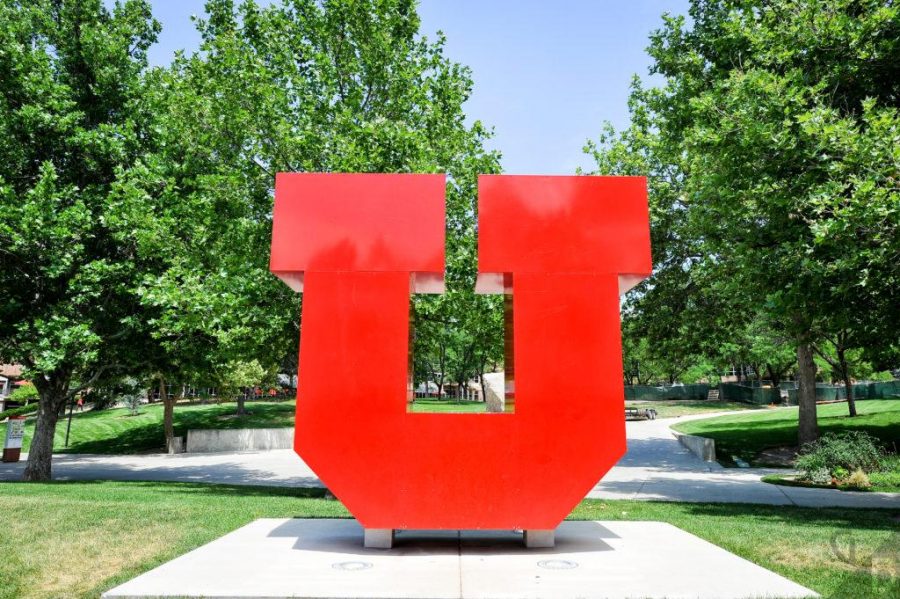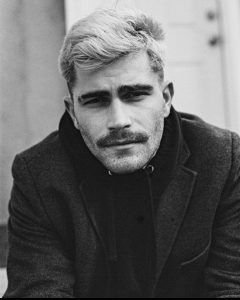Latinx Mental Health Workshop Brings Students Together To Discuss Anger as a BIPOC Student
The Block U on the University of Utah Campus, Salt Lake City, UT on Wednesday, July 12, 2017. (Photo by Adam Fondren | The Daily Utah Chronicle)
March 19, 2023
The University of Utah’s Latinx community and University Counseling Center held its most recent workshop on anger in a series about mental health in the Latinx community.
The Anger We Carry was a roundtable conversation about anger, where it comes from, why it is there and the differences in anger for Latinx people.
Fabi Madrigal and Nicole Puertas Sanchez of the BIPOC Student Support Group All the Feels moderated the discussion. Students and attendees from a diverse range of backgrounds were asked to consider their anger and question not only their emotions but how institutions inform that anger.
The Latinx Mental Health Workshop series is an initiative to provide students an opportunity to discuss the unseen frustration of stigmatization, generational trauma and cultural expectations from their families and society.
Nathalie Ramirez-Ortiz and Adriana Leon, both U students, expressed the anger stemming from a lack of compassion from their parents as first-generation students, gender roles in Latin culture and a lack of diversity on campus.
“For the Latinx community mental health is not really a thing in the culture,” said Ramirez-Ortiz, a second-year social work student. “Having a mental health workshop for the Latinx community can help people in the community see the other side rather than what they are supposed to feel culturally.”
Many students hailing from countries like Argentina, Chile, Honduras, El Salvador and Mexico all shared a common feeling of resentment from previous generations for the opportunity to live and go to college in the U.S. Some students were first-generation Americans whose parents escaped violence, poverty and discrimination.
“A lot of us have immigrant parents,” said Leon, a first-year student in computer science. “They’ve crossed borders, they had so many obstacles and then they look at us and say, ‘Why can’t you handle college?’ or ‘Why are you so stressed?’”
Leon added that parents, documented or not, along with some students do not understand the difficulties in accessing resources for opportunities as an undocumented student. Student organizations at the U like Somos Dreamers advocate for undocumented students.
The Latinx Student Union works to create a community and resources for students living with the particular emotional challenges of being first-generation while creating a culturally familiar space for students.
The event coordinator for the Latinx Student Union, Jasmine Aguilar Lopez, said, “We have parents who have gone through violence crossing the border, many of us are first generation, some of us are undocumented and our parents are like, ‘Well you have it so much easier.'”
Therapy is expensive and many Hispanic youth in Utah are traditionally underserved. “Not a lot of people know about counseling resources on campus,” Aguilar Lopez said. “So we’re trying to help bridge that gap so students know and can have access to therapy.”
The U’s Hispanic enrollment sits at 13%, a distant second to Salt Lake Community College’s 21%, according to KSL. However, initiatives like institutional recruiting, student clubs and mental health counseling are part of a wider Utah initiative to grow and retain Hispanic students in higher education.
Christina Kelly LeCluyse, an outreach coordinator with the University Counseling Center, said that the UCC and Center for Equity and Student Belonging have embedded therapists, like Madrigal and Puertas from All the Feels, who work to make counseling more accessible and relatable for students of color.
For many Latinx students being on a predominantly white campus means fewer opportunities to be seen by their community and even fewer opportunities to meet with a therapist who understands the Latinx experience.
Students at the roundtable talked about the anger that is a result of stigmas like that of the “spicy Latina,” or machismo masculinity and the “forever foreigner trope” that confines people to a status of perpetually foreign due to their status as foreign.
In the discussion, students agreed that seeing other students who look like them was crucial to finding a community of like-minded individuals.
“Knowing my therapist is also a person of color makes me feel like they will be able to understand my point of view,” Aguilar Lopez said.
“I sit here and I see people who look like me and are going through the same struggles and it makes me feel better, like I am not alone and I have someone to relate to,” Ramirez-Ortiz said.
The U’s counseling center is currently working with the Center for Equity and Student Belonging to provide more access to therapy for students along with community workshops to encourage students to utilize resources on campus to discuss their hidden struggles and find other students who can relate.
“These events are allowing us to build a community where all of us are letting ourselves be vulnerable, where we’re not allowed to be vulnerable, like at home or on campus,” said Netza Cuyuch Jaimes, a biology and finance major at the U.
The Latinx Mental Health workshop series will pick up its next meeting on March 30 at 4 p.m. in the Unity Lounge to come together with SOMOS Dreamers to discuss being an undocumented student in Utah.








